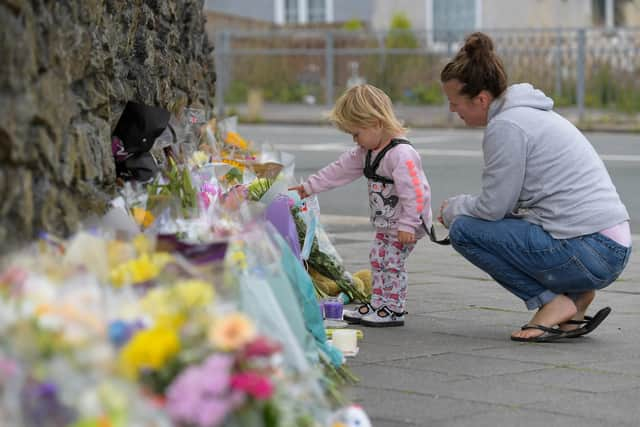Plymouth Shooting: Drop the word 'domestic', violence against women is everybody's problem - Rachel Mackie
A man, who spent time online ranting about women, and admitted to be part of the so-called incel culture, shot his mother with a pump action shot gun.
He then went outside and shot five other people, including a three year old girl.
Advertisement
Hide AdAdvertisement
Hide AdEmma was stabbed outside the hospital she worked in before the man travelled to find Nicole, and murdered her too.
I was working the morning after this happened, the news still pouring in, getting the updates from the police, writing the heartbreaking words that two women had been brutally killed.
Tributes are written, thoughts given and prayers made, then, slowly, we move on and wait for it to happen again.
I know there will be many who say these murders are unconnected. That they have no commonality. That they are isolated, tragic events.


But they aren’t.
Why can’t society call out violence against women?
After the rape and murder of Sarah Everard by a Met Police Officer, the BBC informed us that one woman is killed by a man every three days in the UK.
According to Refuge, one in three women will experience domestic violence in their life.
So why, when it is so horrifyingly common, are we as a society so rubbish at recognising and calling out abuse against women?
Advertisement
Hide AdAdvertisement
Hide AdWhen it comes down to it, violence against woman has always been considered a private matter, a domestic matter.
For all you philosophy fans, it all comes back to Habermas and his precious spheres – dividing society into the public and the private.
The public sphere is an area of political debate and action, a place to share ideas, a place full of public discourse.
The private sphere is the home, an area away from public interest and influence, a place for the individual, not the institution.
So ends the media studies lecture.
Treatment reserved for women
Women have always existed in the private sphere, not the public one – they were the responsibility of their father, husband, brother. No voice or agency of their own. No public influence or involvement.
Violence against women therefore was not seen as a public problem but something that should be dealt with behind closed doors.
Women who spoke out against this were deemed rowdy troublemakers, pushing the feminist agenda into a sphere where it was not welcome.
Fast forward to these enlightened times, and we still have a problem seeing the treatment of women as a public issue, and not something that should be dealt with ‘in house’.
Advertisement
Hide AdAdvertisement
Hide AdLaw makers, police and politicians shrugging their shoulders, muttering ‘well, they’re your relatives...what can I do about it?’
This is not an attitude we take towards any other type of crime, but a treatment reserved specifically for women.
‘Should have picked a better husband love, have you not got any other family to go to?’
What is to be done?
We have to fix the language we use. Words are important.
Don’t you dare tell me ‘there is no wider threat’ after a ‘domestic incident’ where someone driven by hatred of women has murdered people.
I am a woman and there is a wider threat to me.
I get it, people panic when they see a big, public police response – they instantly think ‘terrorist.’
A terrorist is someone outside our culture and society, fighting for something against our values, they are separate and dangerous. They are frightening.
But violence against women? That’s normal. That’s who we are and what we do as a country. It’s so normalised, our fear levels drop when the police say that all important word: ‘domestic.’
Phew, not our problem right? That’s a bloody relief. If it were terrorism, we might have to put new laws in or something to stop it happening again. Might have to have an inquiry. Not now though. Back to my dinner.
Advertisement
Hide AdAdvertisement
Hide AdSo – drop the word domestic. Let’s remember that violence against women – even within the home - is everyone’s problem.
Crossroads of hatred
We need to make an effort to truly understand the history of the treatment of women throughout our society, and how it impacts us today.
We need to see how those old-fashioned conservative values and views of women are still present throughout our institutions.
How other cultural, endemic problems like racism, homophobia and transphobia interlink with misogyny and how the different combinations present themselves.
Misogyny, in all forms, is a public and cultural problem. Let’s not be frightened to say it out loud.
Let’s point at it when it happens, every single time it happens.
Let’s discuss why and how it happened, what should have been done to stop it, and implement lessons learned to stop it happening again.
Let’s consult the experts regularly, not be frightened of radical changes within our legal service, police force and politics.
Advertisement
Hide AdAdvertisement
Hide AdLet’s listen to charities like Women’s Aid, or Rape Crisis Scotland who help women every day in situations of violence and control, and see what they say needs to be done.
Let’s be loud and furious.
I know it’s a huge problem requiring huge cultural change to fix, but please, let’s not do nothing. Again.
Rape Crisis Scotland helpline: 08088 01 03 02
Scottish Women’s Aid helpline: 0800 027 1234
Samaritans: 116 123
A message from the Editor:
Thank you for reading this article. We're more reliant on your support than ever as the shift in consumer habits brought about by Coronavirus impacts our advertisers.
If you haven't already, please consider supporting our trusted, fact-checked journalism by taking out a digital subscription.
Comments
Want to join the conversation? Please or to comment on this article.